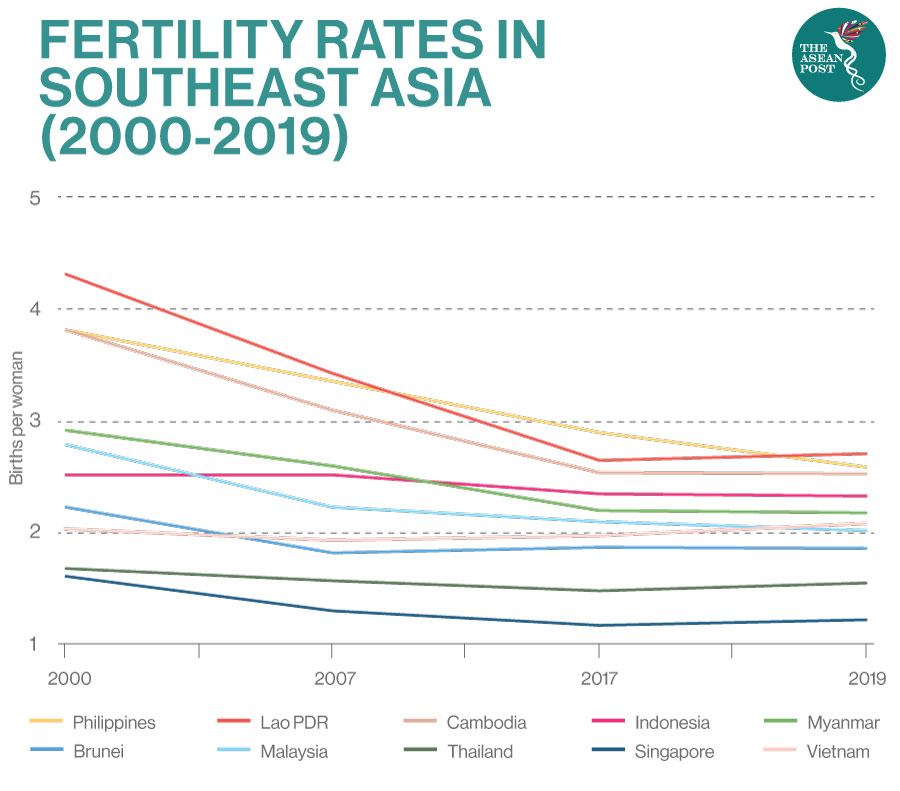In recent years, ASEAN member states have experienced a decline in birth rates with a total fertility rate (TFR) of 2.11 recorded in 2017 down from 5.5 in 1970. According to World Bank data, ASEAN countries such as Brunei, Thailand, Singapore, Malaysia and Vietnam have a TFR below the replacement level of 2.1.
Some of the reasons for this declining fertility rate in the region include an increasing number of women pursuing economic opportunities and subsequently delaying motherhood, rapid urbanisation and migration from rural areas to cities.

However, could the current health crisis, namely the COVID-19 pandemic which has caused citywide lockdowns and strict movement controls affect the region’s birth rate in early 2021?
Malaysia seems to think so.
According to Dr Hamizah Mohd Hassan, the National Population and Family Development Board (LPPKN) Health Unit head in Malaysia, the country is expected to have a baby boom in January 2021 as the country’s Movement Control Order (MCO) enacted on 18 March has caused the majority of married couples to stay at home.
Dr Hamizah was referring to past events in Maine and New Hampshire, in the United States (US) where birth cases increased following the lockdown of the two states for several weeks due to bad snowstorms in 1998.
“The two states had to be on lockdown and residents were confined in the house for a long period of time,” said Dr Hamizah on a locally televised programme.
“Nine months later, the baby boom happened in those two states. A similar situation might happen in Malaysia as the people have to stay at home throughout the MCO period,” she continued.
Nevertheless, a number of experts aren’t entirely on board with this theory.
"I don't foresee a baby boom in nine months," said Dr Renee Wellenstein, a gynaecologist and functional medicine specialist in New York, to the media. Experts have noted that in a less severe context such as a snowstorm, it is common to see an increase in birth rates following a lockdown. However, for more severe circumstances, there could possibly be a decline in birth rates as people are more cautious of their surroundings.
“Previous academic literature has shown that high-mortality events as diverse as famines, earthquakes, heatwaves and disease all have very predictable effects on reducing births nine months later," according to Lyman Stone, a scholar in his 2020 publication for the Institute for Family Studies.
“Push Off” Conceiving
Moreover, couples are advised to “push off” conceiving and getting pregnant for now due to the uncertainty swirling around the COVID-19 pandemic. "It's never ideal to have any infectious disease during the pregnancy due to the unknown impact on the child," explained Wellenstein to the media.
The pandemic has also impacted businesses and local industries. The Asian Development Bank (ADB) warned that the coronavirus pandemic could end up costing the global economy US$4.1 trillion or even more. Many fear that the implications could trigger a global recession, which would affect the livelihoods of millions of people.
Back in Malaysia, addressing the possibility of an increase in the number of pregnancies, Dr Hamizah encouraged married couples to practice family planning through contraceptive methods such as emergency contraceptive pills (ECPs) to prevent pregnancy.
Many soon-to-be mothers, have expressed fears of contracting COVID-19 and passing it on to their unborn child. According to media reports, experts believe that new-borns who tested positive for the virus usually contracted the disease when they were out in the world and not while still in their mother’s wombs.
For Ainun Sofea, a Human Resource executive for an oil and gas giant based in Malaysia, her worries intensify as her delivery date fast approaches. She is scheduled to be in labour next month.
“I worry my baby is going to be exposed to the disease,” she told The ASEAN Post.
“I feel stressed because of the pandemic. There is also the possibility of my husband not being allowed in the delivery room with me. Husband's support is very important and the possibility of him not being by my side is distressing,’ she continued.
Nevertheless, the question of whether Malaysia and the rest of ASEAN will see a surge in births next year can only be answered in due course. According to Richard W. Evans, a Senior Lecturer at the University of Chicago, Director of the Open Source Economics Laboratory and President of Open Research Group, Inc, “…it seems likely that we can expect a small increase in births as a result of the coronavirus,” claiming that it could be more of a baby blip, rather than a baby boom.
Related articles:
